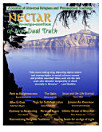Nectar #20: Suffering as Transformation
Babaji Bob Kindler · Joel Levey · Michelle Levey · Sharad Chandra · Lex Hixon · John Forman
মাৰ্চ ২০০৬ · Nectar of Non-Dual Truth কিতাপ 20 · Sarada Ramakrishna Vivekananda Associations
৫.০star
৪ টা পৰ্যালোচনাreport
ইবুক
36
পৃষ্ঠা
family_home
যোগ্য
info
reportমূল্যাংকন আৰু পৰ্যালোচনা সত্যাপন কৰা হোৱা নাই অধিক জানক
এই ইবুকখনৰ বিষয়ে
As we take stock of all that this Winter issue of Nectar contains, it is the theme of suffering which stands out the most and begs for attention and inspection. Whether this suffering is of an emotional nature, a matter of physical ill-health, a case of mental unrest or of intellectual unsurety, it is a constant and nagging consideration on the minds of all beings in relativity. And it is just for this type of reason that teachings of the kind that appear in Nectar are so important and so necessary, for they are brought to bear upon the presence of suffering in healing fashion by the words of illumined souls such as Lord Buddha, Jesus Christ, Sri Sarada Devi, and others. It was this latter, the Holy Mother, who stated, “Misery, suffering, and pain — where will they go, my child? They are our companions in life.” Such admittances on the part of holy beings bring both relief and clarity to the situation, acting as a soothing lenitive to both body and mind. Moreover, the soul may also need amelioration at times, and teachings of a higher order are in store for that end. As one Christian mystic was reported to have said, “If you knew the purpose and benefit of your suffering, you would not ask that it be taken away,” leading us to conclude that suffering plays a role in both neutralizing the effects created by us on the field of action, and weaning us off of all of its causes so that we strive for higher existence.
মূল্যাংকন আৰু পৰ্যালোচনাসমূহ
৫.০
৪ টা পৰ্যালোচনা
এই ইবুকখনক মূল্যাংকন কৰক
আমাক আপোনাৰ মতামত জনাওক।
পঢ়াৰ নির্দেশাৱলী
স্মাৰ্টফ’ন আৰু টেবলেট
Android আৰু iPad/iPhoneৰ বাবে Google Play Books এপটো ইনষ্টল কৰক। ই স্বয়ংক্রিয়ভাৱে আপোনাৰ একাউণ্টৰ সৈতে ছিংক হয় আৰু আপুনি য'তে নাথাকক ত'তেই কোনো অডিঅ'বুক অনলাইন বা অফলাইনত শুনিবলৈ সুবিধা দিয়ে।
লেপটপ আৰু কম্পিউটাৰ
আপুনি কম্পিউটাৰৰ ৱেব ব্রাউজাৰ ব্যৱহাৰ কৰি Google Playত কিনা অডিঅ'বুকসমূহ শুনিব পাৰে।
ই-ৰীডাৰ আৰু অন্য ডিভাইচ
Kobo eReadersৰ দৰে ই-চিয়াঁহীৰ ডিভাইচসমূহত পঢ়িবলৈ, আপুনি এটা ফাইল ডাউনল’ড কৰি সেইটো আপোনাৰ ডিভাইচলৈ স্থানান্তৰণ কৰিব লাগিব। সমৰ্থিত ই-ৰিডাৰলৈ ফাইলটো কেনেকৈ স্থানান্তৰ কৰিব জানিবলৈ সহায় কেন্দ্ৰত থকা সবিশেষ নিৰ্দেশাৱলী চাওক।







